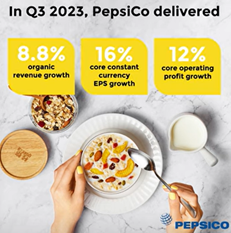PepsiCo (PEP) reported third-quarter sales bubbled up 6.7% to $23.5 billion, with net income increasing a sweet 14.4% to $3.1 billion and EPS popping 14.9% to $2.24. Macro events have led consumers to become more selective, trading down or choosing smaller sizes. However, across channels that tend to be leading growth indicators, including convenience and food service, management sees healthy demand, says Ingrid Hendershot, editor of Hendershot Investments.
Organic revenue grew by 8.8% from last year, boosted by an 11% increase from pricing and product mix, partially offset by a 2.5% decline in organic sales volumes.
 By business segment, PepsiCo Beverages North America sales increased 8% to $7.16 billion, Frito-Lay North America sales increased 7% to $5.95 billion, and Europe sales increased 2% to $3.7 billion. Latin American sales increased 21% to $3.06 billion, Africa, Middle East and South Asia sales fell 6% to $1.6 billion, Asia Pacific, Australia, New Zealand and China increased 4% to $1.2 billion, and Quaker Foods North America sales increased 5% to $747 million.
By business segment, PepsiCo Beverages North America sales increased 8% to $7.16 billion, Frito-Lay North America sales increased 7% to $5.95 billion, and Europe sales increased 2% to $3.7 billion. Latin American sales increased 21% to $3.06 billion, Africa, Middle East and South Asia sales fell 6% to $1.6 billion, Asia Pacific, Australia, New Zealand and China increased 4% to $1.2 billion, and Quaker Foods North America sales increased 5% to $747 million.
PepsiCo ended the quarter with $10.27 billion in cash and investments, $35.84 billion in long-term debt, and $18.8 billion in shareholders’ equity.
Thus far, the impact of the weight-loss treatments on PepsiCo’s business is negligible and management remains optimistic about the snacking category’s future given several tailwinds, such as an increased snacking lifestyle due to the rise of the middle class in emerging markets and continued urbanization with meals becoming smaller and more unstructured.
Furthermore, during the past five years, the company has worked to transform its portfolio to align with health-conscious consumer preferences, reducing sodium, fat, and sugar content and launching healthy snacks and beverages.
Looking ahead, management believes the company is well-positioned to adapt and execute in a dynamic consumer environment given its trusted brands and numerous investments in manufacturing, supply chain, productivity improvements, digitization, and technology. As a result, the company raised its full year 2023 earnings outlook, projecting adjusted EPS of $7.54, up 11% from last year, on organic revenue growth of 10%.
Meanwhile, PEP reiterated its 2023 organic revenue growth forecast of +10% and the expectation of returning $7.7 billion to shareholders through dividends of $6.7 billion and share repurchases of $1.0 billion. Given the strength of PepsiCo’s business and categories, for fiscal 2024, it expects to deliver results toward the upper end of long-term targets for organic revenue growth of 4% to 6% and high-single-digit EPS growth.
Recommended Action: Buy PEP.










